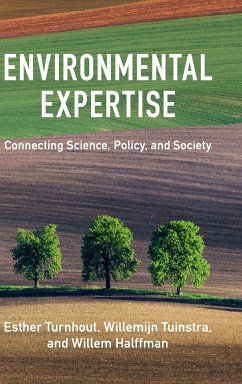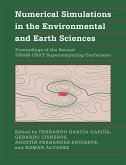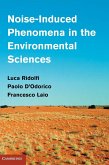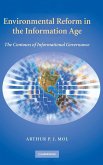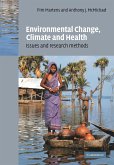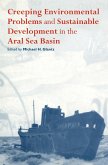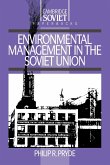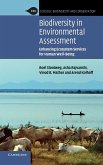- Gebundenes Buch
- Merkliste
- Auf die Merkliste
- Bewerten Bewerten
- Teilen
- Produkt teilen
- Produkterinnerung
- Produkterinnerung
Provides an overview of the important role that environmental experts play at the science-policy interface, and the complex challenges they face.
Andere Kunden interessierten sich auch für
![Numerical Simulations in the Environmental and Earth Sciences Numerical Simulations in the Environmental and Earth Sciences]() Fernando García-García / Gerardo Cisneros / Agustin Fernandez-Eguiarte / Roman Alvarez (eds.)Numerical Simulations in the Environmental and Earth Sciences48,99 €
Fernando García-García / Gerardo Cisneros / Agustin Fernandez-Eguiarte / Roman Alvarez (eds.)Numerical Simulations in the Environmental and Earth Sciences48,99 €![Noise-Induced Phenomena in the Environmental Sciences Noise-Induced Phenomena in the Environmental Sciences]() Luca RidolfiNoise-Induced Phenomena in the Environmental Sciences158,99 €
Luca RidolfiNoise-Induced Phenomena in the Environmental Sciences158,99 €![Environmental Reform in the Information Age Environmental Reform in the Information Age]() Arthur P. J. MolEnvironmental Reform in the Information Age129,99 €
Arthur P. J. MolEnvironmental Reform in the Information Age129,99 €![Environmental Change, Climate and Health Environmental Change, Climate and Health]() Environmental Change, Climate and Health72,99 €
Environmental Change, Climate and Health72,99 €![Creeping Environmental Problems and Sustainable Development in the Aral Sea Basin Creeping Environmental Problems and Sustainable Development in the Aral Sea Basin]() Michael Glantz (ed.)Creeping Environmental Problems and Sustainable Development in the Aral Sea Basin94,99 €
Michael Glantz (ed.)Creeping Environmental Problems and Sustainable Development in the Aral Sea Basin94,99 €![Environmental Management in the Soviet Union Environmental Management in the Soviet Union]() Philip R. PrydeEnvironmental Management in the Soviet Union50,99 €
Philip R. PrydeEnvironmental Management in the Soviet Union50,99 €![Biodiversity in Environmental Assessment Biodiversity in Environmental Assessment]() Roel SlootwegBiodiversity in Environmental Assessment165,99 €
Roel SlootwegBiodiversity in Environmental Assessment165,99 €-
-
-
Provides an overview of the important role that environmental experts play at the science-policy interface, and the complex challenges they face.
Hinweis: Dieser Artikel kann nur an eine deutsche Lieferadresse ausgeliefert werden.
Hinweis: Dieser Artikel kann nur an eine deutsche Lieferadresse ausgeliefert werden.
Produktdetails
- Produktdetails
- Verlag: Cambridge University Press
- Seitenzahl: 290
- Erscheinungstermin: 28. Mai 2019
- Englisch
- Abmessung: 235mm x 157mm x 20mm
- Gewicht: 574g
- ISBN-13: 9781107098749
- ISBN-10: 1107098742
- Artikelnr.: 53486845
- Herstellerkennzeichnung
- Libri GmbH
- Europaallee 1
- 36244 Bad Hersfeld
- gpsr@libri.de
- Verlag: Cambridge University Press
- Seitenzahl: 290
- Erscheinungstermin: 28. Mai 2019
- Englisch
- Abmessung: 235mm x 157mm x 20mm
- Gewicht: 574g
- ISBN-13: 9781107098749
- ISBN-10: 1107098742
- Artikelnr.: 53486845
- Herstellerkennzeichnung
- Libri GmbH
- Europaallee 1
- 36244 Bad Hersfeld
- gpsr@libri.de
Esther Turnhout is a Professor at the Forest and Nature Conservation Policy Group of Wageningen Universiteit, The Netherlands. Her research program, 'The Politics of Environmental Knowledge', includes research into the different roles experts play at the science-policy interface, the political implications of policy-relevant environmental knowledge and the interaction between science, society and citizens.
List of contributors
Preface
List of abbreviations
1. Introduction: the plight of the environmental scientist Willem Halffman, Esther Turnhout and Willemijn Tuinstra
2. What is science? (And why does this matter?) Willem Halffman
3. Frames: beyond facts versus values Willem Halffman
Case A. Framing climate change Mike Hulme
4. Science, politics and the public in knowledge controversies Esther Turnhout and Thomas Gieryn
Case B. What does 'climategate' tell us about public knowledge controversies? Silke Beck
Case C. Whose deficit anyway? Institutional misunderstanding of fracking sceptical publics Laurence Williams and Phil Macnaghten
5. The limits to knowledge Willemijn Tuinstra, Ad Ragas and Willem Halffman
Case D. Angry bulbs Ad Ragas and Marga Jacobs
6. Usable knowledge: science, policy and society Willemijn Tuinstra, Willem Halffman and Esther Turnhout
Case E. Expertise for European fisheries policy Willem Halffman and Martin Pastoors
7. Interdisciplinarity and the challenge of knowledge integration Esther Turnhout
Case F. Knowledge integration in the Millennium Ecosystem Assessment Clark Miller
Case G. Integrated assessment for long-range transboundary air pollution Willemijn Tuinstra
8. Lay expertise Esther Turnhout and Katja Neves
Case H. Lay expertise and botanical science: a case of dynamic interdependencies in biodiversity conservation Katja Neves
Case I. The Loweswater Care Project Claire Waterton
9. Environmental Experts at the science-policy-society interface Esther Turnhout
Case J. Group Think and whistle blowers in CO2 capture and storage Heleen de Coninck
10. Environmental knowledge in democracy Esther Turnhout, Willem Halffman and Willemijn Tuinstra
11. Conclusion: science, reason and the environment Willem Halffman, Willemijn Tuinstra and Esther Turnhout
Inde
Preface
List of abbreviations
1. Introduction: the plight of the environmental scientist Willem Halffman, Esther Turnhout and Willemijn Tuinstra
2. What is science? (And why does this matter?) Willem Halffman
3. Frames: beyond facts versus values Willem Halffman
Case A. Framing climate change Mike Hulme
4. Science, politics and the public in knowledge controversies Esther Turnhout and Thomas Gieryn
Case B. What does 'climategate' tell us about public knowledge controversies? Silke Beck
Case C. Whose deficit anyway? Institutional misunderstanding of fracking sceptical publics Laurence Williams and Phil Macnaghten
5. The limits to knowledge Willemijn Tuinstra, Ad Ragas and Willem Halffman
Case D. Angry bulbs Ad Ragas and Marga Jacobs
6. Usable knowledge: science, policy and society Willemijn Tuinstra, Willem Halffman and Esther Turnhout
Case E. Expertise for European fisheries policy Willem Halffman and Martin Pastoors
7. Interdisciplinarity and the challenge of knowledge integration Esther Turnhout
Case F. Knowledge integration in the Millennium Ecosystem Assessment Clark Miller
Case G. Integrated assessment for long-range transboundary air pollution Willemijn Tuinstra
8. Lay expertise Esther Turnhout and Katja Neves
Case H. Lay expertise and botanical science: a case of dynamic interdependencies in biodiversity conservation Katja Neves
Case I. The Loweswater Care Project Claire Waterton
9. Environmental Experts at the science-policy-society interface Esther Turnhout
Case J. Group Think and whistle blowers in CO2 capture and storage Heleen de Coninck
10. Environmental knowledge in democracy Esther Turnhout, Willem Halffman and Willemijn Tuinstra
11. Conclusion: science, reason and the environment Willem Halffman, Willemijn Tuinstra and Esther Turnhout
Inde
List of contributors
Preface
List of abbreviations
1. Introduction: the plight of the environmental scientist Willem Halffman, Esther Turnhout and Willemijn Tuinstra
2. What is science? (And why does this matter?) Willem Halffman
3. Frames: beyond facts versus values Willem Halffman
Case A. Framing climate change Mike Hulme
4. Science, politics and the public in knowledge controversies Esther Turnhout and Thomas Gieryn
Case B. What does 'climategate' tell us about public knowledge controversies? Silke Beck
Case C. Whose deficit anyway? Institutional misunderstanding of fracking sceptical publics Laurence Williams and Phil Macnaghten
5. The limits to knowledge Willemijn Tuinstra, Ad Ragas and Willem Halffman
Case D. Angry bulbs Ad Ragas and Marga Jacobs
6. Usable knowledge: science, policy and society Willemijn Tuinstra, Willem Halffman and Esther Turnhout
Case E. Expertise for European fisheries policy Willem Halffman and Martin Pastoors
7. Interdisciplinarity and the challenge of knowledge integration Esther Turnhout
Case F. Knowledge integration in the Millennium Ecosystem Assessment Clark Miller
Case G. Integrated assessment for long-range transboundary air pollution Willemijn Tuinstra
8. Lay expertise Esther Turnhout and Katja Neves
Case H. Lay expertise and botanical science: a case of dynamic interdependencies in biodiversity conservation Katja Neves
Case I. The Loweswater Care Project Claire Waterton
9. Environmental Experts at the science-policy-society interface Esther Turnhout
Case J. Group Think and whistle blowers in CO2 capture and storage Heleen de Coninck
10. Environmental knowledge in democracy Esther Turnhout, Willem Halffman and Willemijn Tuinstra
11. Conclusion: science, reason and the environment Willem Halffman, Willemijn Tuinstra and Esther Turnhout
Inde
Preface
List of abbreviations
1. Introduction: the plight of the environmental scientist Willem Halffman, Esther Turnhout and Willemijn Tuinstra
2. What is science? (And why does this matter?) Willem Halffman
3. Frames: beyond facts versus values Willem Halffman
Case A. Framing climate change Mike Hulme
4. Science, politics and the public in knowledge controversies Esther Turnhout and Thomas Gieryn
Case B. What does 'climategate' tell us about public knowledge controversies? Silke Beck
Case C. Whose deficit anyway? Institutional misunderstanding of fracking sceptical publics Laurence Williams and Phil Macnaghten
5. The limits to knowledge Willemijn Tuinstra, Ad Ragas and Willem Halffman
Case D. Angry bulbs Ad Ragas and Marga Jacobs
6. Usable knowledge: science, policy and society Willemijn Tuinstra, Willem Halffman and Esther Turnhout
Case E. Expertise for European fisheries policy Willem Halffman and Martin Pastoors
7. Interdisciplinarity and the challenge of knowledge integration Esther Turnhout
Case F. Knowledge integration in the Millennium Ecosystem Assessment Clark Miller
Case G. Integrated assessment for long-range transboundary air pollution Willemijn Tuinstra
8. Lay expertise Esther Turnhout and Katja Neves
Case H. Lay expertise and botanical science: a case of dynamic interdependencies in biodiversity conservation Katja Neves
Case I. The Loweswater Care Project Claire Waterton
9. Environmental Experts at the science-policy-society interface Esther Turnhout
Case J. Group Think and whistle blowers in CO2 capture and storage Heleen de Coninck
10. Environmental knowledge in democracy Esther Turnhout, Willem Halffman and Willemijn Tuinstra
11. Conclusion: science, reason and the environment Willem Halffman, Willemijn Tuinstra and Esther Turnhout
Inde

